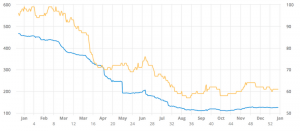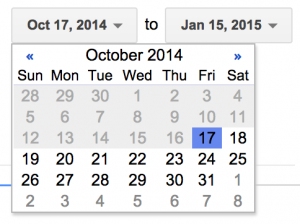 There sure was a lot of drama last week as the SEO community discussed the comments left in this Whiteboard Friday posted by Moz. Paul Macnamara, whom I respect greatly when it comes to figuring out algorithmic issues posted this epic rant on Rae Hoffman's site in which he wrote about his concerns with Moz's WhiteBoard Friday. The video was presented by Josh Bachynski. In it, he presented his theory that a site could not recover from Penguin by simply disavowing their links. His argument was that every time he had seen a site that said they recovered from Penguin by just using the disavow tool, it could not have been a "pure disavow" because he could see evidence of link loss in ahrefs.com.
There sure was a lot of drama last week as the SEO community discussed the comments left in this Whiteboard Friday posted by Moz. Paul Macnamara, whom I respect greatly when it comes to figuring out algorithmic issues posted this epic rant on Rae Hoffman's site in which he wrote about his concerns with Moz's WhiteBoard Friday. The video was presented by Josh Bachynski. In it, he presented his theory that a site could not recover from Penguin by simply disavowing their links. His argument was that every time he had seen a site that said they recovered from Penguin by just using the disavow tool, it could not have been a "pure disavow" because he could see evidence of link loss in ahrefs.com.
In the comments section, many of us took issue with this hypothesis. Many sites can see link loss over time, especially if they have a spammy backlink profile. Linking domains die...especially if they are low quality spammy sites. And that's going to present as link loss. Here is the ahrefs link graph for a site that I know for certain has not done any link removal but previously had a good number of low quality links that probably just died out on their own:

How can I prove that this site has not done link removal? Well, I can't. And this is the problem with Josh's theory...no one can prove without a shadow of a doubt that a site can escape Penguin without doing any link removal. There are too many variables. Still, in this post I'll give you some examples of a few of the cases where I have seen a site improve in the eyes of Penguin and I am quite certain that no link removal was done.
John Mueller weighs in
I decided to write this post today because I was watching the latest Webmaster Central Hangout with John Mueller. There's irony here because I was watching this while I was doing a link audit for a Penguin hit site so I can file a disavow. 🙂
Check out this video starting at 43:26. I've transcribed the important parts below:
Mihai Aperghis asks John, "Josh Bachynski had a WhiteBoard Friday and it stirred quite a bit of controversy. He was basically saying that disavowing links for removing the Penguin penalty isn't enough. You cannot get out of a Penguin penalty just by disavowing links. You have to take at least other steps like actually removing the links themselves, otherwise just disavowing them won't be enough."
John replied saying that for manual actions you definitely need to remove links. But he said this, "With regards to algorithmic changes that were picking up on problematic links, technically you don't need to do that. You CAN just use the disavow tool." He went on to say that practically it does make sense to do a cleanup where possible, but, "for our algorithms, the disavow file is essentially sufficient in those cases."
That's pretty clear, isn't it? John has said similar things before, saying that disavowing a link is essentially the same as removing a link when it comes to Penguin. I wrote a long article about everything that John has said about disavowing vs removing over here on Search Engine Watch.
But John has been wrong before!
It's no secret that I'm a big John Mueller fan. I love that he does these hangouts where we can ask questions about ranking issues. I love his heart for helping webmasters. But I have to tell you that I was pretty disillusioned with the communication (or lack of communication) surrounding the release of Penguin 3.0. When Penguin 3.0 rolled out in late October 2014, I kept telling people who hadn't recovered that it had to be still rolling out. Then John said that as far as he knew it was finished. Agh. Then he said later on that he may have been mistaken because it looked like Penguin still was rolling out after all.
This confusion made me realize that we can't take everything that John says as a for-sure gospel truth announcement from Google. He's not the spokesperson for webspam. But in fairness, when John said that Penguin had fully rolled out, he did preface it with "as far as I know". In this case, when talking about disavowing vs removing, he was quite confident in his answer.
Where's the proof?
Josh has repeatedly asked those of us who do a lot of disavow work to prove that a disavow alone can help a site escape from Penguin hell. There are a few reasons why this is hard to prove:
- Many sites that we work on have multiple issues. Sure, we may have done a pure disavow, but there's a possibility that we also worked to clean up on site issues. One could argue then that we didn't do a pure disavow, but that there were other factors that went into the recovery.
- Some sites with a pure disavow won't see improvement. I have seen a number of sites that have done a disavow, with no link removal, and they did NOT recover when Penguin refreshed. Does this mean that a pure disavow didn't work? In many cases, once links were disavowed there was nothing left to help support rankings. Some of these sites may also have issues with other algorithms.
- Sometimes the analytics don't tell the story. I have seen a few sites that have made fantastic jumps from a disavow alone going from page 6 to the bottom of page 1 for their main terms. The problem is though that it's going to be hard to show evidence for these recoveries. Analytics is not going to show a big increase in clicks once you jump up to position #9. Webmaster Tools impression data should probably show increases, but unless I'm registered with Webmaster Tools for that site I'm not going to have that data. Also, it only goes back 3 months. I've just opened up Webmaster Tools to get some screenshots to use of sites that improved with disavow alone and look at that...the farthest back I can go is October 17 - The exact day that Penguin 3.0 refreshed. So, I won't be able to show you before and after images of impression data:

Examples of sites that saw Penguin improvements without removing links
Here is the analytics data for a small business that saw good improvement in the eyes of Penguin in October:

For this site we did a manual link audit and a pure disavow. We didn't remove any links. The site jumped from page 2-3 for most queries to top 3.
This next example has an interesting story. The client came to me in September of 2013 and wanted to do a disavow as they had been losing rankings since the May 2013 Penguin 2.0 update. We did a thorough link audit, with no link removals, and filed a disavow and then on October 4, 2013 we saw a DROP in rankings. I was not happy about that. I told the client that most likely what had happened was that by the time we filed our disavow in late September, Google had not recrawled enough of the links in order for the disavow to be recognized by the time Penguin refreshed in early October. I told the client that most likely we would see improvement with the next Penguin refresh. I did not know at the time that we would have to wait a whole year before that refresh happened! When it did happen on October 17, 2014, I got an excited email from the business owner saying that their rankings had suddenly reappeared and they were #1 and #2 for many of their terms. I don't have Google analytics data for this site, but here is the story according to SEMRush:

Here's one more site for which we did some disavow work and no link removal was done. They were hit by Penguin in May of 2013 and saw a nice 20% increase in traffic when Penguin 3.0 recognized their disavow work:

The problem with all of these though is that there is no way that I can prove to you that we didn't remove links for any of these sites, but rather, just did a disavow. You'll have to take my word for this.
Conclusions
Does this conclusively show that you can recover a site from Penguin by just disavowing and not removing any links? Well, no. But it does show some examples of cases where this disavowing alone appeared to work well.
My biggest regret over the whole WhiteBoard Friday fiasco was not in the fact that the video got published, but rather in the way that we handled the subject in the comments. I think that debate is good. But we need to be able to debate and not defame each other. (I'm speaking to myself here too!)
Josh commented that those of us who sell "disavow as a service" are selling snake oil. I would argue that in many cases the opposite is true. I have seen companies that will file a disavow for a fee, or they will do a disavow plus link removal for three times that fee. I do feel that there are companies out there who are making good money off of link removal, when perhaps this may not be necessary. Still, I'm not out to vilify anyone. I think that as long as we are transparent to our clients, explain our decision making clearly, and don't make promises that we can't back up, then we're doing ok. There is still a lot about Penguin that we don't have figured out.
OK. I'm glad I got this out of my system. And now I'm going to go back to doing what I love doing and that is auditing links ad nauseam so that I can file a disavow and hopefully get a client out of Penguin trouble.
What do you think?
If you do Penguin work, how much link removal do you do? Have you seen a site improve in the eyes of Penguin after just disavowing? I'd love to hear your comments.



Comments
Just to play devil’s advocate…
In my experience Google Penguin is temperamental and some obvious cases of blackhat tactics don’t get punished while sites I felt were working nearly all whitehat have been hit. So i’m not trying to discredit your findings but it could be possible that sites bounce in and out of the penguin filter on their own and not because of the disavow.
Re-reading my comment I can’t help but notice how weak what I’m saying sounds, but in my experience lots of sites seem to be in and out of penguin for no obvious reasons. It might be changes in the way the algo works that kicked it out or false positives. All in all I’m just tired of listening to the Google team in general be so unspecific and unhelpful to webmasters while their decisions make or break businesses, possibly families and maybe even lives at times.
I can definitely see your point. I wrote this post here ( http://www.mariehaynes.com/something-wrong-with-penguin/) because I feel like there are still a lot of things wrong with Penguin. I’ve seen sites that should really recover that have not. It stands to reason that perhaps the opposite happens too.
I think that some sites can see some kind of recovery from Penguin if enough spammy links just die out and the scales tip in the favor of the good links.
Moz has become the Mecca for SEO snake oil. It seems like everyone publishing there is trying to sell something and the quality of the “research” is barf-level at best. People should consider the source of the egregious claims and move on.
I strongly believe that disavow does help, but that other signals such as successful link removals can lend themselves well to resolving the problem sooner. If you look at link detox’s boost services, between the lines it looks like a rapid indexing service. Another variable to consider is that all your disavowed links might not be counting at the time of a penguin refresh if all the offending pages have yet to be crawled.
That being said, anyone that’s pulled backlink reports on a weekly/bi-monthly basis will tell you the backlink profile is a living, breathing animal.
Finding a site without natural link loss would simply not be possible. Especially for a penalized site where link building was done heavily to incur such a penalty to begin with. The nature of said links themselves really puts anyone at odds for meeting that test criteria of no link loss on the disavow.
There’s bound to be an uproar when the general consensus is that the test criteria cannot be met under any natural circumstances. “Aliens do exist, now prove me wrong.”
Actually, you should better try to completely remove low-quality links, rather than only disawoving them. http://depenalize.me/ can make this job for you.